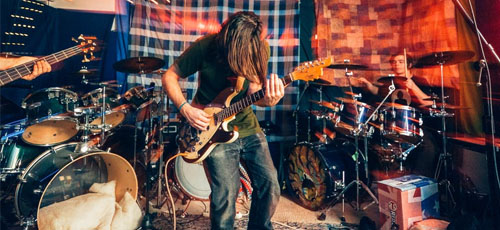
Every time a ‘Best Electronic Music Albums’ list is made, Kraftwerk’s ‘Trans-Europe Express’ is in or near the number one spot. Recorded in 1976, this album is far older than today’s clubbers, doesn’t find itself in DJ sets and doesn’t get much radio play. So just how has it stayed at the top for so long?
Creativity and Innovation

Recorded in Dusseldorf, Germany, in the summer of 1976 and released in March 1977 on Kling Klang Records; Trans-Europe Express (or Trans Europa Express) was Kraftwerk’s sixth studio album.
The band had already developed a melodic, minimal electronic style, with some manipulated vocals, but this was pushed further still on ‘Trans Europe Express.’ This vocal development is often accredited to David Bowie and Iggy Pop, who met with the band just before the lyrics for ‘Trans-Europe Express’ was recorded.
A creative leap on this album was also possible thanks to the use of a new sequencer known as the ‘Synthanorma Sequencer’. This customised piece of equipment was made especially for the band by Matten & Wiechers. The 32-step 16 analogue sequencer allowed for much more elaborate synthesiser parts, which can be heard to great effect on the tracks ‘Endless Endless’ and ‘Franz Schubert’. The style of the album is minimalist, with simple, often repeated themes, a result of band member Ralf Hutter’s belief, “If we can convey an idea with one or two notes, it is better than to play a hundred or so notes”.
On their previous album, ‘Radio-Activity’, Kraftwerk had recorded in a mix of both the German and English languages. However, ‘Trans-Europe Express’ was recorded as two completely separate albums, one in German and one in English. At the insistence of the Label Manager at Capitol Records, Maxime Schmitt, ‘Les Mannequins’, a French version of the track ‘Showroom Dummies’, was also added. This heightened the European journey concept of the album, along with the emphasis the group wished to place on the post-war re-defining of German culture and of modern industrialisation.
At the time of release, the album had average reviews, reaching 119 on the American charts and being voted number 30 in 1977’s Pazz and Jop Critics Poll. Music critic Robert Christgau wrote the album’s “textural effects sound like parodies by some cosmic schoolboy of every lush synthesiser surge that’s ever stuck in your gullet—yet also work the way those surges are supposed to work”. The album didn’t chart in the UK until 1982, when it stayed in the charts for just seven weeks, peaking at number 42. A release of the single, ‘Showroom Dummies’, made the charts for five weeks, making a high of number 25.
Although not a huge hit at the time, the legacy of this album went on to be considerable. Techno owes a debt to its clean beats, whilst Afrika Bambaataa’s heavy borrowing for ‘Planet Rock’ also makes it an influence on hip-hop. If you’re too young to have heard it, or it’s been a while since you did, dig out the original album or 2009 remaster and sit back and pay homage to the pioneers of electronica and grandfathers of techno.
